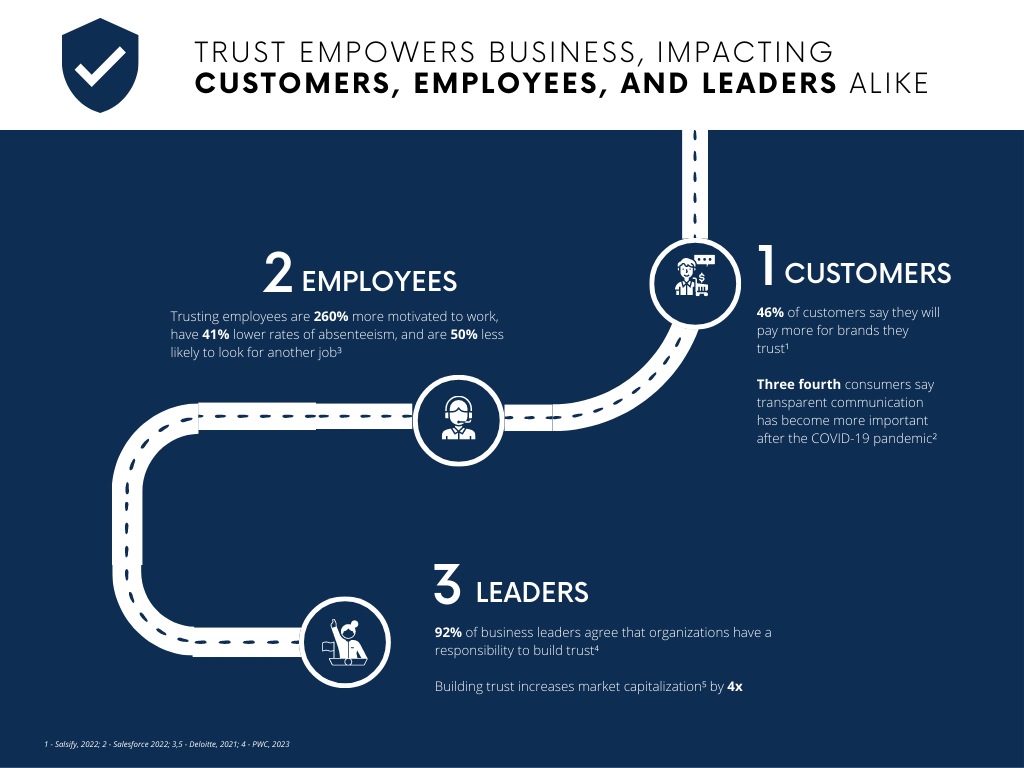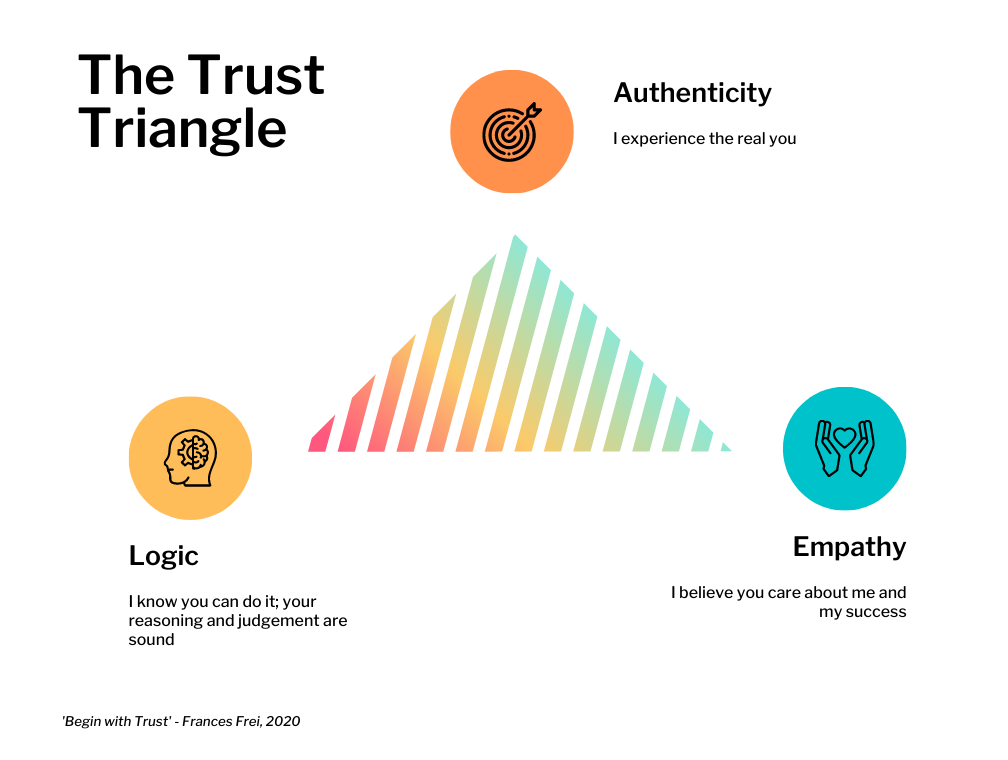Can I trust you with my heart, even in business?
By Nitin Raj

Trust is a delicate equilibrium vital for thriving relationships and communities. In business, it emerges as a critical force distinguishing leaders1. Picture a captivating scene: a handshake laden with unspoken promises, resonating with authentic power, where trust becomes the cornerstone of successful leadership.
However, trust’s fragility demands constant nurturing and unwavering commitment. Initial impressions may not mirror long-term realities, adding complexity to building and maintaining trust. As a fine balancing act, even small missteps can lead to confusion and uncertainty.
A 4-year-old’s lesson in trust
In my cherished childhood, a transformative moment unfolded. At the age of four, I was playfully tasked by my grandfather to clean our residential campus in the absence of the cleaning lady. Embracing the challenge with unwavering enthusiasm, I skipped breakfast and wholeheartedly dedicated myself to meticulously sweeping every inch, leaving no trace of dirt behind. The result was not only recognition and a 2-rupee (80 INR ~ 1 USD) reward, but also a priceless gift bestowed upon me – my grandfather’s trust.
Initially perplexed by the overwhelming praise for a seemingly simple task, I later grasped the profound lesson hidden within this experience: trust is earned through honesty, unwavering dedication, and wholehearted commitment. Now, as an adult, I try to carry that same level of commitment and honesty with me wherever I go. Because at the end of the day, trust is everything. It’s what allows us to form connections with others and build lasting relationships. And in business, it’s no different2.
What is trust and what does it mean in a business setup?
Trust is the state of being open and willing to be vulnerable while embracing risks. It is a continuous process reinforced with every interaction. It requires cultivating awareness, practicing tolerance, seeking understanding, and responding without defensiveness. Essential elements such as authenticity, logic, and empathy play crucial roles in fostering trust3.
Several drivers influence trust. Ability stands out as individuals need to demonstrate competence in fulfilling their promises and commitments. Benevolence plays a significant role, involving genuine care and a sincere intention to support and uplift others. Integrity, the alignment between personal values and perceived reliability and ethical conduct, is fundamental in building trust. When these drivers are present, trust can flourish, forming the foundation for strong and lasting relationships.
Recognizing the humanity within businesses can shift our perspective and open doors to building trust.
Yet, the challenge lies in the inherent skepticism that sometimes makes it hard to trust businesses. They can appear cold and impersonal, solely driven by the pursuit of profit. However, it is important to remember that businesses are made up of people. People with faces, personalities, and quirks, just like you and me. Recognizing the humanity within businesses can shift our perspective and open doors to building trust.

An intriguing observation arises: as a person’s power increases, their perceived trustworthiness often decreases4. This perception stems from the assumption that powerful individuals care less about others. However, the reality is that their reduced reliance on others might make them seem less trustworthy. This insight highlights the importance of understanding the individuals behind positions of power and acknowledging their humanity.
As a business owner, it is crucial to remember that you are dealing with real people. People who have families, hobbies, and dreams. If you want them to trust you, you need to show them that you care about them as individuals, not just as customers or employees. Authenticity, empathy, and transparency become key to building trust within your business.
The rewards of building trust are abundant, from improved business terms to enhanced innovation and more robust relationships throughout the value chain. Trust equips businesses with greater resilience and purpose, enabling them to weather shocks and crises with fortitude and effectiveness5.
How to build and measure Trust?

Building and measuring trust requires a deliberate effort. It should be the default approach, woven into our actions every day. Fundamental honesty serves as the cornerstone of our business endeavors. Building trust necessitates authenticity, logic, and empathy. People are inclined to trust when they perceive genuine interactions, have confidence in judgment and abilities, and feel genuinely cared for.
Trustworthy leadership serves as the starting point, integrated into the very fabric of corporate culture. A truly remarkable leader knows the value of listening, and understanding that success becomes lasting when achieved without compromising principles. Establishing, nurturing, extending, and restoring trust become the paramount competency in this era. Following through on commitments, taking ownership of mistakes, and finding the courage to speak up are vital steps in building trust.
Trust and trustworthiness need to be measured and operationalized within the organization, empowering employees on a personal level. Transparency and empowerment play significant roles in building trust. Addressing difficult topics openly and giving credit where due encourage positive behavior and strengthen trust. Authenticity is vital; people must see the true you. Accessible leaders who embrace radical transparency foster trust by sharing data, goals, missteps, and milestones at every level. Regular feedback surveys can gauge employees’ job satisfaction and further strengthen trust.
Effective communication is crucial in developing trust. Open and honest dialogue builds a foundation of transparency and reliability. Actively listening, demonstrating empathy, honoring commitments, and delivering on promises reinforce trustworthiness.
A truly remarkable leader knows the value of listening, and understanding that success becomes lasting when achieved without compromising principles.
In conclusion, trust is a complex and nuanced force that underpins successful leadership and business relationships. It is built through honesty, dedication, and wholehearted commitment. But at its core, it’s all about people, and it holds the power to shape connections, influence performance, and foster loyalty. By acknowledging the human in the businesses, prioritizing authenticity, and embracing effective communication, we can build trust, nurture relationships, and create a foundation for lasting success.
References
1 Trust in leaders drives maximum employee engagement, leading to 2.5x revenue growth – Qualtrics
2 Nearly 50% of customers would pay more to buy from a brand they trust – Salsify
3 Core drivers of trust – HBR
4 “Edelman Trust Barometer” Trust decreases from top positions to the lowest – Edelman
5 64% of consumers globally are belief-driven buyers – Edelman
Fantastic web site. Plenty of helpful info here. I’m sending it to some friends ans additionally sharing in delicious.
And certainly, thank you for your sweat!
Thank you so much for your kind words! Its great to hear that you find the website helpful, and fantastic to know you’re sharing it with your friends, and we truly appreciate your support. If you have any questions or need more information on a specific topic, feel free to reach out. Thanks again for your encouragement!